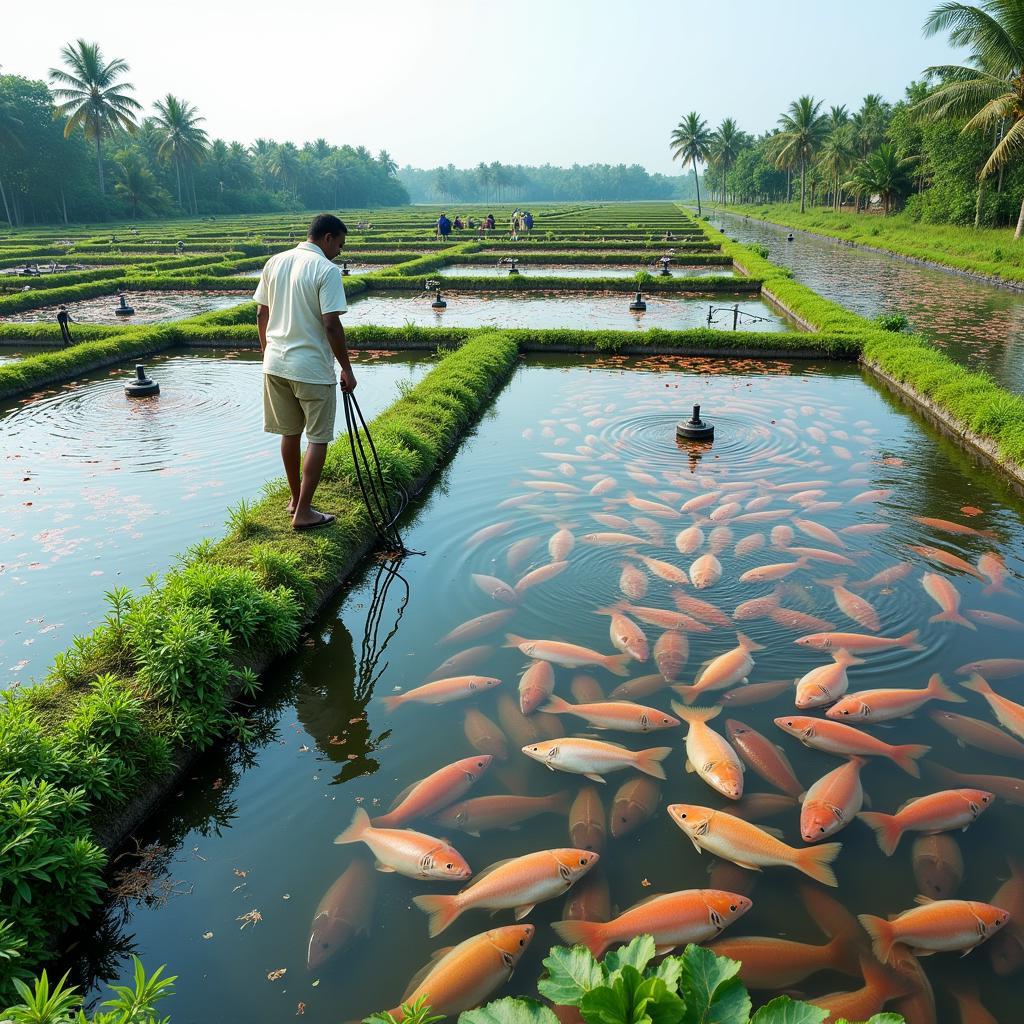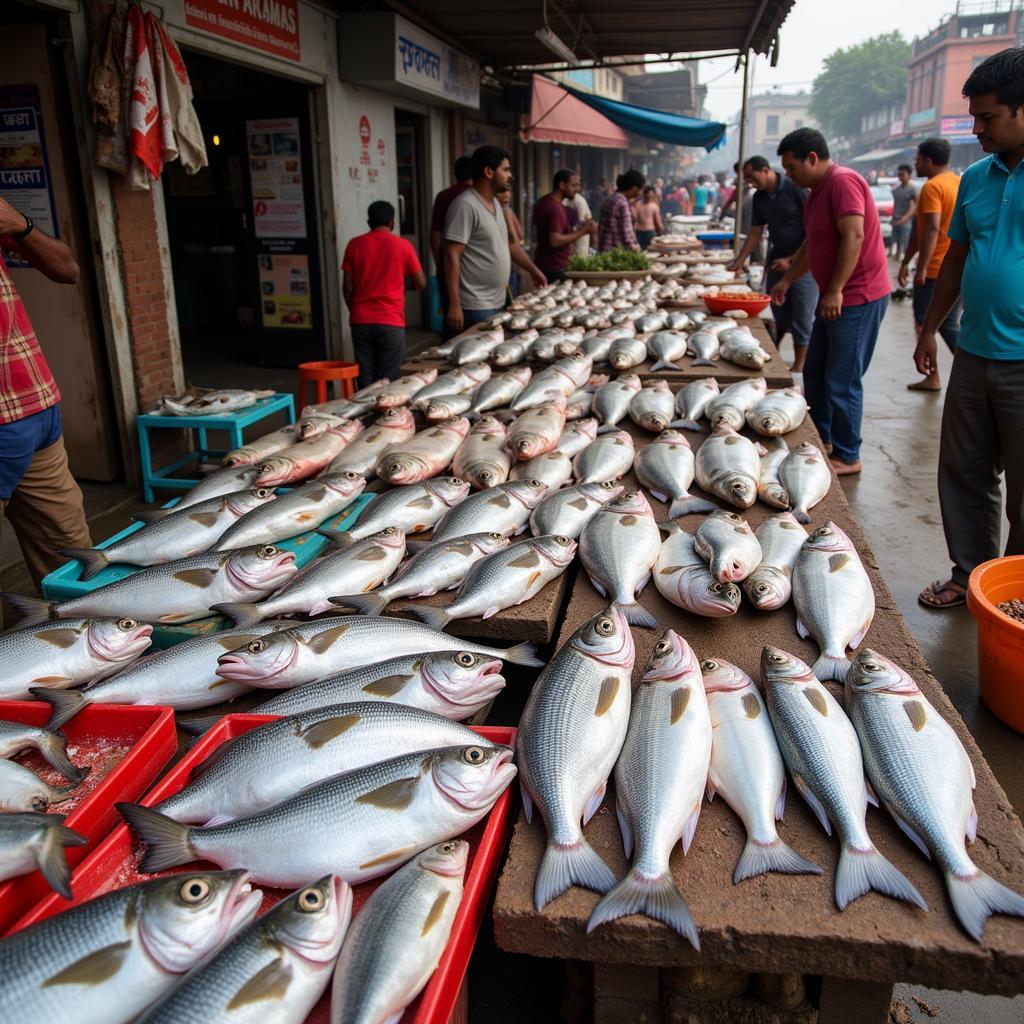African Fish Banned in India: A Deep Dive
The African fish ban in India has sparked curiosity and debate. But what’s the story behind this seemingly unusual restriction? This exploration delves into the details of this ban, examining its ecological and economic implications.
The Rise of African Catfish in India
In the 1990s, India witnessed the introduction of African catfish species, primarily the Clarias gariepinus, for aquaculture purposes. The fish, known for its fast growth rate and resilience in various water conditions, quickly gained popularity among Indian farmers.
 African Catfish Farming in India
African Catfish Farming in India
The Ban and Its Rationale
However, the burgeoning African catfish industry soon faced opposition, leading to a ban in several Indian states. The primary reasons cited for this ban include:
-
Ecological Concerns: The African catfish, considered an invasive species in India, raised concerns about its potential to disrupt native fish populations and ecosystems. Its predatory nature and ability to outcompete local species for resources caused alarm among conservationists.
-
Socioeconomic Impact: Traditional Indian fishermen, dependent on native fish species, argued that the proliferation of African catfish negatively impacted their livelihoods. They claimed that the introduced species depleted fish stocks, affecting their catch and income.
-
Health and Safety: Concerns arose regarding the farming practices associated with African catfish. Some argued that the intensive farming methods and potential use of antibiotics could pose health risks to consumers.
 Traditional Indian Fish Market
Traditional Indian Fish Market
The Debate and Its Implications
The ban on African catfish in India ignited a debate with valid arguments from both sides. While proponents of the ban emphasize the need to protect native biodiversity and livelihoods of traditional fishermen, opponents argue that the ban negatively affects fish farmers and consumers who benefit from the affordable protein source that African catfish provides.
“The introduction of any non-native species has its own set of consequences,” says Dr. Anjali Kumar, a marine biologist specializing in invasive species. “While the African catfish might offer economic advantages, its potential long-term impact on India’s delicate aquatic ecosystems cannot be ignored.”
Navigating the Future
The ban on African fish in India underscores the complexities of balancing economic benefits with ecological and social considerations. Finding a sustainable solution requires a multi-pronged approach:
-
Scientific Research: Further research is crucial to fully understand the ecological impact of African catfish in India. This research can inform policy decisions and management strategies.
-
Sustainable Aquaculture Practices: Promoting responsible aquaculture practices that minimize environmental impact is key. This includes regulating fish feed, managing waste, and preventing the escape of farmed fish into the wild.
-
Empowerment of Local Communities: Supporting traditional fishing communities through alternative livelihood programs and sustainable fishing practices is essential.
african goregeous fish banned in india
Conclusion
The African fish ban in India presents a complex issue with no easy answers. While the ban aims to protect native biodiversity and livelihoods, its impact on various stakeholders needs careful consideration. Moving forward, a balanced approach that prioritizes ecological sustainability, economic viability, and social equity is crucial for navigating the future of the African catfish in India.
FAQs
1. Is all African Fish Banned In India?
While the term “African fish” is often used generally, the ban primarily targets specific species like the Clarias gariepinus (African catfish). Other African fish species may not be banned.
2. Why was African catfish introduced to India in the first place?
African catfish was introduced for its fast growth, adaptability, and potential to boost aquaculture yield, aiming to meet the rising demand for affordable protein.
3. What are the potential solutions to address the concerns?
Solutions include promoting sustainable aquaculture practices, conducting comprehensive research on the ecological impact, and supporting traditional fishing communities.
4. What is the current status of the ban?
The ban on African catfish varies across Indian states, with some enforcing it strictly while others have relaxed restrictions.
5. What are the implications for consumers?
The ban can impact the availability and price of certain fish in the market, potentially affecting consumers who rely on affordable protein sources.
african catfish illegal in india why
For any inquiries or assistance, please reach out to us:
Phone: +255768904061
Email: [email protected]
Address: Mbarali DC Mawindi, Kangaga, Tanzania
Our customer service team is available 24/7 to assist you.

